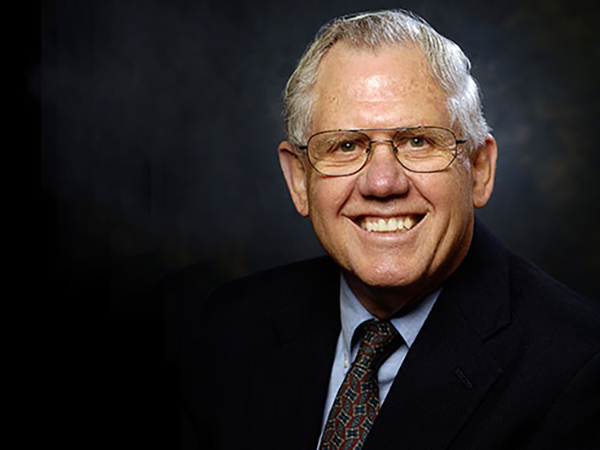For much of his career, Jack Lemons, Ph.D., has been a man in the middle. Lemons has straddled the line between dentistry and engineering, providing a valuable link between those who create and improve dental and other medical devices, and those who actually use them.
 “There seem to major changes or advancements (in devices) about every five years,” Lemons says. “My role has been to translate information about these changes to (dentists and surgeons). There needs to be people who understand the properties of the systems we’re using, and then can bring that to the surgical or practice theater.
“There seem to major changes or advancements (in devices) about every five years,” Lemons says. “My role has been to translate information about these changes to (dentists and surgeons). There needs to be people who understand the properties of the systems we’re using, and then can bring that to the surgical or practice theater.
“I’m sort of that person who is sitting in between those two.”
It is a seat Lemons has occupied in one form or another for more than a half-century. He began working at the University of Alabama at Birmingham as a Fellow in 1968. Over the ensuing decades, he has mentored and chaired more than 300 student theses and dissertations, leading to more than 600 publications.
Lemons’ primary appointment and activity has been in the UAB School of Dentistry Department of Prosthodontics, known as Biomaterials when he chaired it. In 2011, the Department of Biomedical Engineering created the Dr. Jack Lemons Endowed Scholarship in Biomedical Engineering in gratitude for his contributions to graduate education.
Lemons credits his interactions with students for contributing to his lengthy career. “I’ll be meeting with students who are talking about things that are really, really interesting,” Lemons says. “I never know what to expect in terms of what they’re going to propose or do. It’s all different types of things, and that’s what keeps you interested.”
Lemons’ UAB career began in an unlikely place: at a machine and repair shop in his hometown of St. Petersburg, Fla. He spent much of his time cutting apart old cars and preparing the metal for resell.
“I realized that I could spend my whole life doing that, but I really was not very interested in it,” Lemons says. “I met a guy there who was a civil engineer graduate from Georgia Tech. He said that no matter how much I worked, I’d never make as much as he did because he had a degree. So I joined the engineering program at a local junior college, then transferred to UAB at the sophomore level.”
Once he arrived at UAB, Lemons never left. While doing some collaborative work with Southern Research Institute, Lemons began teaching night classes at UAB in engineering before eventually being offered a position as an associate professor.
“When I joined the school, a program already existed in the medical school for computer science. Then we brought in the laboratory as an active part of the program with orthopedic surgery and biomedical engineering and formed the Department of Biomedical Engineering,” Lemons said. “I never realized at the time what was being done, that multiple disciplines were being put together. We just all started interacting.”
In order to have a fuller understanding of what was needed from a dental standpoint, Lemons went through dental school, though he says he never planned on practicing dentistry.
“I was a Fellow from the National Institutes of Health, and they allowed me to rotate through the clinical activities without intending to be a dentist,” Lemons says. “I primarily did surgery activities in the dental school, then did most of the medical school rotation. My intent always was to be in laboratory research. But doing the dental procedures gave me the opportunity to appreciate what dentists do.
“I try to limit what I do to the laboratory research aspect. I’ve been involved in a lot of patient contact, but always as a third person. I’ve often assisted with instruments and hardware. The way the program was structured, people who had other backgrounds like mine were accepted without a problem.”
Now a professor emeritus in the schools of Dentistry and Engineering, as well as the Heersink School of Medicine, Lemons says the key to all this is multi-disciplinary collaboration, a concept he learned from working with former UAB presidents (as well as dental school deans and dentists) Dr. Joseph Volker and Dr. Charles “Scotty” McCallum.
“They both were so good at recognizing what other people do and what they know, and then applying that knowledge and skill as needed,” Lemons says. “It’s all about helping people gain education about things they weren’t previously educated about.
“What I do is as much engineering as it is medical. Most complex surgical procedures use some sort of hardware or device. My role was to help figure out what we could do to the physical structure to give it the maximum strength. Then I’d advise them on what instruments should be used in different situations.”
For his efforts, Lemons was awarded the Sam Brown Bridge Builder Award in 2014.
His primary goal in all cases, Lemons says, has always been the same.
“Everyone is attempting to do the very best they can in terms of patient care,” Lemons says. “We might come at a situation from different disciplines. But in all my time at UAB, I’ve never known a situation of anybody doing something that wasn’t in the best interest of patient care.”
For the man in the middle, that concept is always front-and-center.